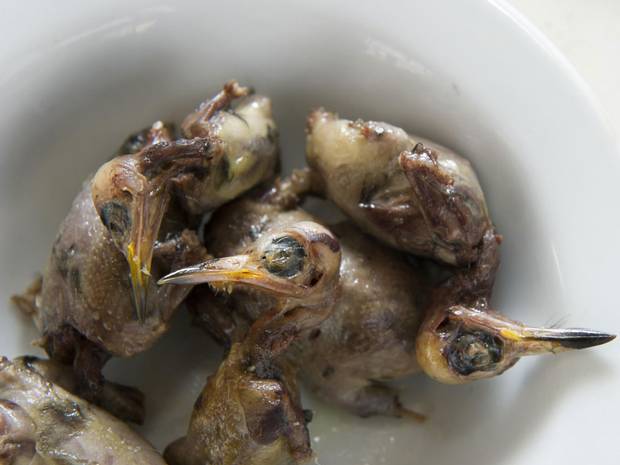
Some 20% of all species of birds have become extinct because of us. Image above of Cypriots killing migrating songbirds for pickling. Once caught and killed, the birds are then sold to restaurants in the Republic of Cyprus, which serve ambelopoulia, a traditional Cypriot dish
A new study reveals that over the last 20,000-50,000 years birds have undergone a major extinction event, inflicted chiefly by humans, which caused the disappearance of about 10%-20% of all avian species.
According to the researchers, the vast majority of the extinct species shared several features: they were large, they lived on islands, and many of them were flightless.
The study was led by Prof. Shai Meiri of the School of Zoology
and Amir Fromm of the Weizmann Institute of Science. The paper was published in the Journal of Biogeography.
Prof. Meiri: “We conducted a comprehensive review of scientific literature, and for the first time collected quantitative data on the numbers and traits of extinct species of birds worldwide. Those that became extinct in the last 300 years or so are relatively well known, while earlier species are known to science from remains found in archaeological and paleontological sites worldwide. Altogether we were able to list 469 avian species that became extinct over the last 50,000 years, but we believe that the real number is much higher.”
The researchers think that the vast extinction was caused primarily by humans, who hunted the birds for food, or by animals brought to islands by humans – that fed on the birds and/or their eggs. This assumption is based mainly on two facts: First, the greater part of bird remains were found on human sites, apparently belonging to birds consumed by the inhabitants. Second, in most cases the extinctions occurred a short time after the arrival of humans.
The researchers also found that extinction was not random, as most extinct species shared three major features:
- About 90% of them lived on islands. When humans arrived on the island, the birds were hunted by them, or fell victim to other animals introduced by humans, such as pigs, rats, monkeys, and cats.
- Most extinct bird species were large, some very large. Consequently, since each bird provided humans with a great quantity of food, they were a preferred target for hunters. In fact, the body mass of the extinct species was found to be up to 10 times as large as that of surviving species. Previous studies have found a similar phenomenon among mammals and reptiles, especially lizards and turtles that lived on islands: the larger ones were hunted by humans and became extinct.
- A large portion of the extinct bird species were flightless, and often unable to escape their pursuers. The study found that the number of flightless bird species that became extinct is double the number of flightless species still existing today; all in all, 68% of the flightless bird species known to science became extinct. One of the better-known examples is the moa bird in New Zealand: 11 species of moa became extinct within 300 hundred years, due to hunting by humans
How you can help?
- Join a bird conservation organization.
- Sponsor a land trust (email me about one we are building in Nipissing, Ont – [email protected].) so nature and man can live in harmony
- Support organizations that catch animal traffickers, like what Ofir Drori is doing in Africa
- Educate your fellow people in the Middle East that killing owls is a dumb superstition
- Share the message that real men don’t hunt rare birds
